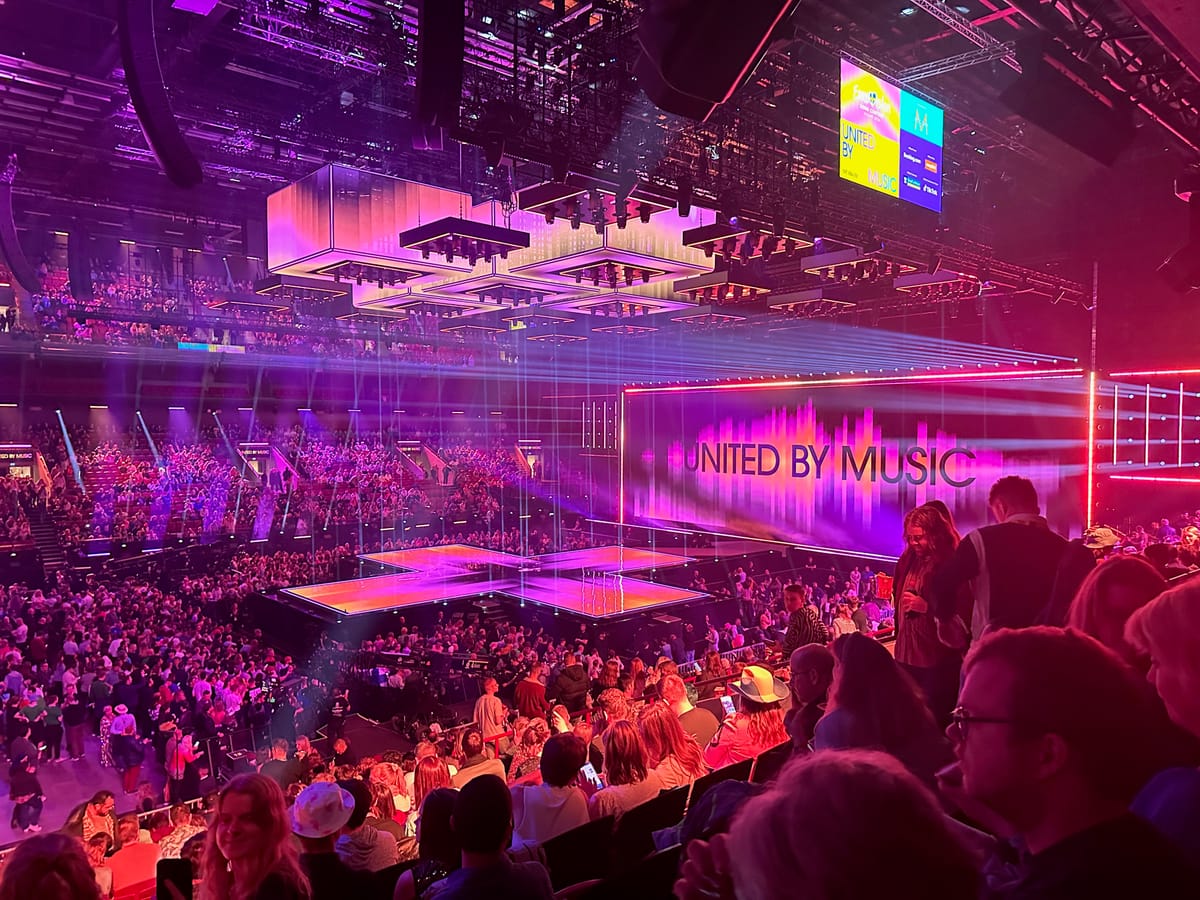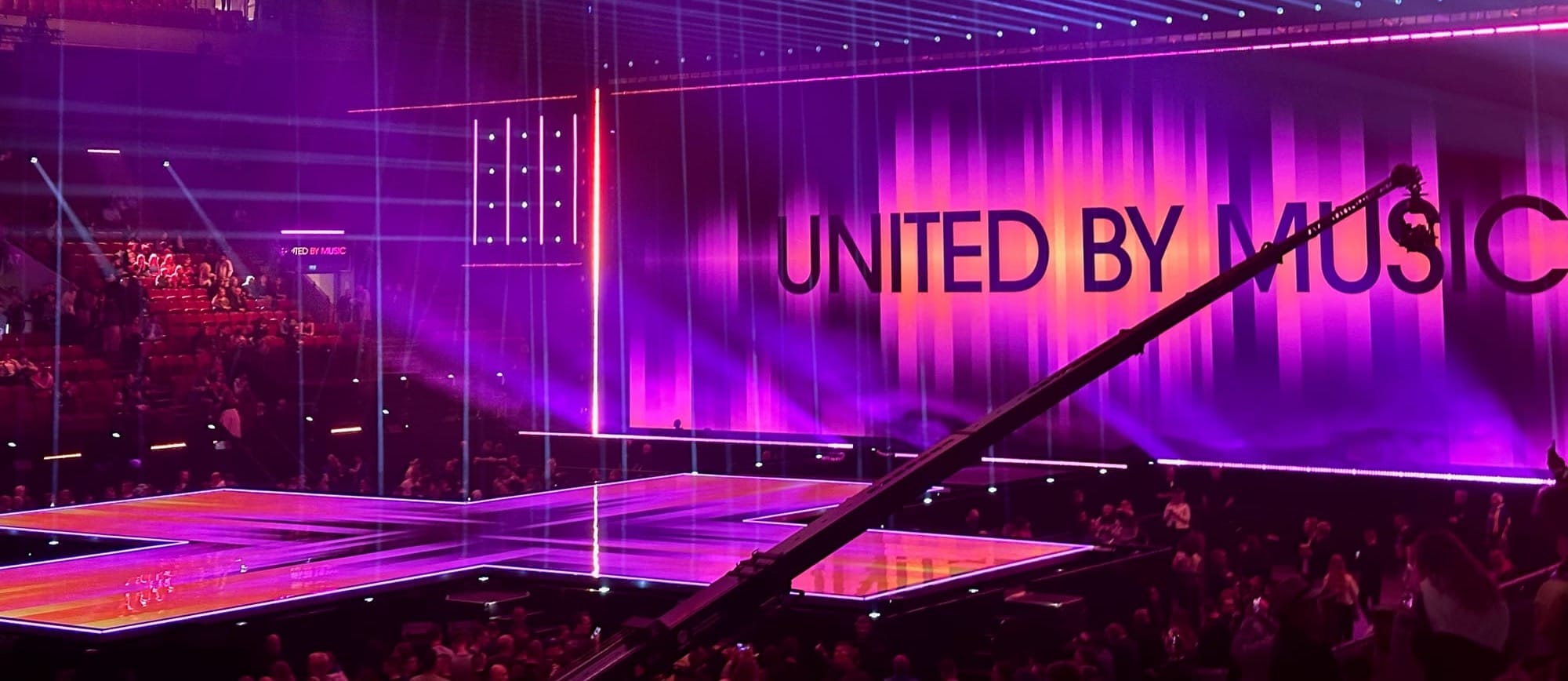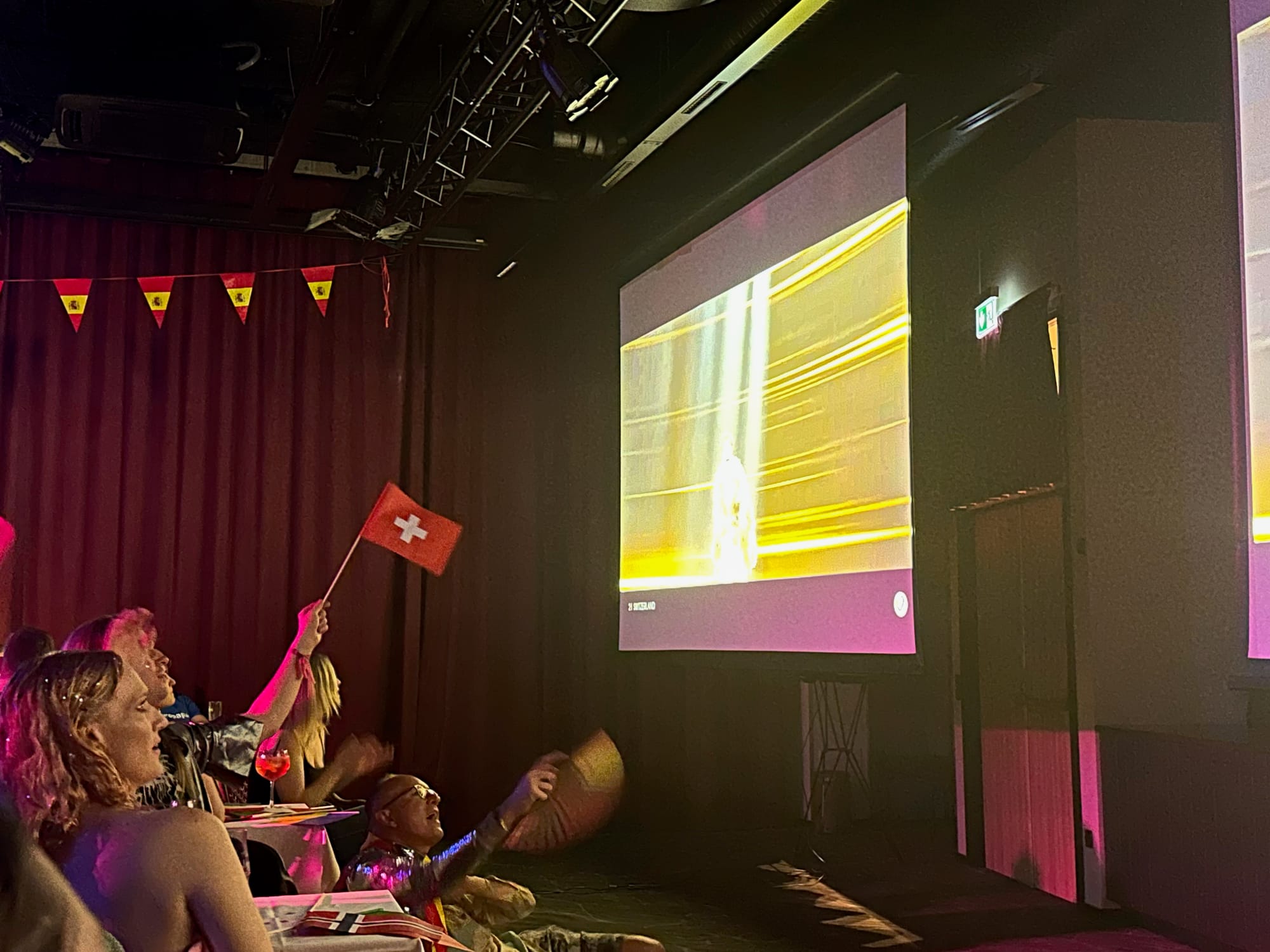Eurovision 2025: A preview ahead of music's biggest live event

Let the 69th Eurovision Song Contest begin! For some, May might mean ogling at the Met Gala but real fans know that the real glitz, glamour, and glitter is happening an ocean away. Eurovision, the song festival that’s been compared to the Olympics… and American Idol (a lot), is days away from taking place in Basel, Switzerland. It’s a show (well, shows) that’s equal parts praised and mocked but is truly beloved across the continent and the world as an audience of roughly 160 million tunes in from around the world to see 37 countries from across Europe (and Australia) compete in a festival of song.
For the artists, it has the opportunity to make a star out of you (as ABBA, Celine Dion, Loreen, and Duncan Laurence among others can attest). For the participating broadcasters, it’s a chance to test the newest in broadcast technology. For Europe, it’s a chance to unite over the spirit that brings the landmass together.
The EBU started the program in 1956, modeled after Italy’s renowned Sanremo Music Festival to unite a continent torn apart by World War II and to test new technology that allowed the show to be broadcast live across the continent in real time. It’s grown from seven competing countries to as many as 43 countries competing across three nights.
Those three nights of competition are the result of months of work. Each country’s participating broadcaster can choose any song released between September 1st of the prior year and the mid-March delegation meeting that’s no longer than three minutes in length to participate. While some countries make their choice internally, others host national selection shows that hold just as much if not more significance than the main shebang in May.
Musically, the contest knows no bounds showcasing everything from the atmospheric beauty of an entry like Nocturne (Norway’s winning entry in 1995) to the absolute insanity of Irlande Douze Points (Ireland’s 2008 entry featuring a screaming puppet name-checking various pieces of European lore). It’s as much about visual intrigue as the song itself, and the stories that can be told over 180 seconds. If you can think of it, it’s probably been tried at Eurovision (whether it’s fire, handwashing, seductively playing the saxophone, or swinging around like a kebab).
Why are we in Basel?
Nemo won last year's contest with The Code, a song that blends operatic vocal chops with rap to trace their coming out as nonbinary. Swiss broadcaster SSG SSR immediately confirmed plans to host, with hosting bids placed by the cities of Basel, Bern (with Biel/Bienne co-hosting), Geneva, and Zurich.
Switzerland is in many ways the home of Eurovision as the EBU is based in Geneva and the first contest was held in Lugano. It's the first time the contest has been back since 1985 following the win of some small singer named Celine Dion.
How do you win?
The format has changed over the years, but currently ten semifinalists from each show (held on Tuesday and Thursday) advance to Saturday's grand final along with the five biggest financial contributors to the EBU (the United Kingdom, France, Germany, Italy, and Spain; lovingly referred to as the "Big 5") and each year's host country (typically the country that won the previous year).
All of the countries are randomly allocated to a semifinal during the allocation draw typically held in late January-early February, where the current host city officially takes over from the previous one (there was a ridiculously large keychain). The big five countries and the host country are also allocated to vote in one of the two semifinals, where their song will also be performed live.
After every song is performed during the semifinal, viewers in the participating countries (plus a "rest of the world" vote) can vote for their favorite competing song (but not their own country) and those votes are converted to a 12 point scale (12 for a country's favorite song, 10 for their second favorite, 8 for their third favorite, and so on). The 10 countries with the highest amount of points advance (though they're revealed in no particular order and we don't know the full results until after the grand final).
During the final, the process is repeated with the addition of each country's national jury (typically made up of music industry professionals, past Eurovision artists, and media representatives) who also rank the songs. All viewers can vote and the two voting pools' results are revealed separately.
Each country's national jury will have their votes revealed by spokespeople (typically someone from the participating country with Eurovision ties either as a host or participant), while the show's hosts reveal the televote in order of the country's national jury vote (the country with the lowest jury score gets revealed first and the country with the highest jury score gets revealed last). Countries do tend to at times vote for their neighbors, whether out of pure favoritism or similar music tastes, sometimes to a hilarious extent. Greece and Cyprus are particularly known for exchanging 'douse points' (12 points) to each other.
Can this work elsewhere?
Funny you ask that, because the EBU is seriously exploring expanding the format abroad. The American Song Contest, a spinoff hosted by Kelly Clarkson and Snoop Dogg, ran in 2022 on NBC to middling ratings and was subsequently cancelled. There have been talks to bring the contest format to Latin America, Canada, Asia, and Africa, but none have come to fruition beyond exploratory details.
Politics at play
While the EBU claims to be an apolitical entity and runs Eurovision as such, it's hard to avoid politics at a time when multiple wars are being fought on the continent. Countries aren't allowed to send lyrics that are overtly political (Belarus was banned after failing to submit a non-political song in 2021 and Israel had to resubmit their entry last year after it made references to the October 7th music festival attack). Despite this, the contest has long been a soft power tool (looks at Azerbaijan) and an opportunity to comment on political affairs within their nation and abroad.
We've most recently seen things flare up with both the Russia-Ukraine war and Israel's continued occupation in Palestine. Russia was banned from the 2022 contest (with its broadcasters subsequently leaving the Union in protest) in response to multiple broadcasters threatening a boycott if Russia was still allowed to participate after they invaded Ukraine.
The broadcasting union's statement on the matter was interesting since it's remained a sticking point for fans calling for Israel to face a similar fate:
The decision reflects concern that, in light of the unprecedented crisis in Ukraine, the inclusion of a Russian entry in this year's Contest would bring the contest into disrepute.
Things with Israel have been significantly more complicated. In the run-up to last year's contest, there was significant public pressure for Israel to be barred from competing as a result of their actions in Palestine. There were large protests in Malmö, Sweden (last year's host city) and Copenhagen opposing their involvement and calls to boycott the competition as a whole. Eric Saade, Sweden's 2011 representative who happens to be of Palestinian descent, brandished a keffiyeh while performing during a segment showing fan favorite entries that got second place.

There was scrutiny in the arena on flags being brought into the arena with fans only being allowed to bring a participating country's flag. (I had a run in with security who questioned my Maltese flag.) Eventual winner Nemo was forced to smuggle in a nonbinary flag.
The underlying tension blew up in the middle of last year's Eurovision week when Joost Klein, the Netherlands' representative, was accused of making a threatening gesture to a production crew member believed to be from Israel's public broadcaster KAN. (Malmö's police department conducted an investigation and found no wrongdoing.) Klein was subsequently disqualified to a bevy of protests within the show. Multiple spokespeople pulled out of presenting their countries' votes and some acts took to wearing Palestinian colors (Portuguese act iolanda notably wore nails inspired by the Palestinian flag).
Irish broadcaster RTÉ has confirmed in a statement that the EBU has made a "commitment... to have a wider discussion amongst members in due course" in response to growing pressure from the Slovankian, Spanish, and Icelandic broadcasters on Israel's participation. It's probably unlikely that any changes would be made this late in the game for this year's contest, but it's definitely something to watch going into 2026.
The flag policy has been amended for this year's contest, with artists allowed to wear only their country's flag in "official Eurovision spaces" including on stage, the green room, turquoise carpet, and the Eurovision Village fan festival stage. Danish broadcaster DR and Dutch broadcaster AVROTROS have protested the policy on behalf of their artists. Denmark's artist Sissal, who's from the Faroe Islands, would be particularly affected since she can't wear her home country's flag on stage. Fans can bring in any flag that complies with Swiss law, which notably includes the Palestinian flag.
In a statement to CNN, the EBU said that they wanted to "strike a balance to ensure that our audiences and artists can express their enthusiasm and identities, whilst at the same time provide more clarity for the delegations when it comes to official spaces."
Time will tell what kind of flags we see in the stands next week, but protests were seen during the Turquoise Carpet opening ceremony event on Sunday.

On the Ground
Eurovision week takes on a festival atmosphere in the host city. Beyond the nine live shows held over six days at the arena, the host city is filled with brand activations and opportunities to meet artists and fellow fans. I went to last year's contest in Malmö and it honestly felt like a bubble that you had to work hard to escape from.
The atmosphere inside the arena is akin to a football match where fans passionately support their favorite acts and countries. Even for the dress rehearsals, it's such a fun environment to be in and an appearance I wouldn't trade in for anything.
Throughout the week, the host city and the EBU host community-led activations at Eurovision Street (typically held along a main thoroughfare) and the Eurovision Village, where artists will typically make performances during the day and a public watch party is held for the live shows. Eurovision fan site Wiwibloggs also hosts a fan event that features artist appearances and interviews throughout the week.

When darkness comes, the party is just beginning as artists and delegations party it up at the official Euroclub filled with live music until the sun comes up. There are also several fan-run club experiences including the Eurofansclub run by a group of Spanish Eurovision fans with appearances from several artists and live viewings of the shows.

The Field
Perhaps the most important question is who's competing for the crown this year. While there's always the potential for an act to make a late surge once we see the full performance live, here's a look at some of the songs to watch in the odds as of Sunday evening.
Sweden - KAJ "Bara Bada Bastu"
Sweden could very easily be needing to host again if the odds have their way. The comedy trio KAJ won Melodifestivalen with an ode to the sauna, the most Finnish of traditions. The group comes from Vörå, Finland, a city on the country's west coast where Swedish is the dominant language. It's hard not to want to end up soaking in some steam after seeing this number that's done the impossible task of getting Finns and Swedes on the same team.
Austria - JJ "Wasted Love"
Written in part by Eurovision alum Teya (behind the brilliant 2023 Austrian entry Who the Hell is Edgar?), JJ brings his chops from the Vienna State Opera to Wasted Love. There's no love lost as JJ croons about a lost love. From rehearsal footage we've seen, the staging conjures black and white imagery of a sinking boat with a package that looks like it'll pack quite the emotional punch.
Finland - Erika Vikman "Ich komme"
Erika Vikman took the symbolism of the 69th Eurovision to heart with a female empowerment anthem about sexual pleasure. The song was ready for prime time from its performance at Uuden Musiikin Kilpailu with a slick performance featuring increasingly bigger microphone stands.
Finnish broadcaster Yle has revamped UMK massively since 2020 to become a credible place for Finnish acts to launch new music with growing fan interest both in Finland and abroad. Vikman's been a big part of that revival with her first appearance in 2020, becoming a fan favorite among Eurovision fans with the similarly sensual Cicciolina (there were dancing bears).
Estonia - Tommy Cash "Espresso Macchiato"
I'll preface this by saying that I don't think it'll win the whole thing, but I do think it'll be a cult classic for being bizarre. The song's driven mixed reviews in Italy for basically making a caricature of Italian culture in broken Italian. Tommy Cash has been known to parody other cultures (last year he released a song called Untz Unto that parodied German techno culture), but also does it purely out of comedy. The song came about as the result of many recording trips to the country and honestly is kind of nonsensical. Nevertheless, I can see it popping off in the televote.
Switzerland - Zoë Më "Voyage"
It's always hard for a country to pull a double, but Basel native Zoë Më could make it happen with this beautiful ballad. It's the one song this year that stopped me in my tracks on first listen. Honestly, just give it a listen and you'll get why it's my favorite song this year. It's the type of risk that I appreciate from a country that doesn't have to qualify for the grand final and it's bound to do well in the jury vote.
How to Watch
The contest airs live Tuesday, Thursday, and Saturday at 3pm ET/Noon PT (9pm local time) on Peacock in the United States, your participating broadcaster across Europe and Australia, and on the Eurovision YouTube channel.